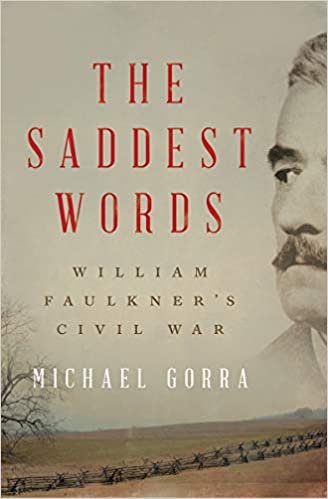History and Memory and The Saddest Words
 I’m reading Michael Gorra’s wonderful new book The Saddest Words: William Faulkner’s Civil War (Liveright, 2020), and I just came across a passage that articulates the difference between history and memory in one of the most effective ways I’ve ever read.
I’m reading Michael Gorra’s wonderful new book The Saddest Words: William Faulkner’s Civil War (Liveright, 2020), and I just came across a passage that articulates the difference between history and memory in one of the most effective ways I’ve ever read.
Gorra has thus far woven a fascinating narrative in which he’s “telling a story, a critical narrative in which Faulkner’s chronicle of his imagined land will find itself entwined with our country’s history, and with other voices too: the diaries and letters of the war years, and the memoirs of the generation after; other novelists as well, and then the historians who in trying to make sense of it all seem to tell us as much about their own moment as they do about the war itself.” The result has offered an illuminating look at the war and the postwar South, particular Mississippi. It’s also shedding light on Faulkner’s work, although it’s not a traditional work of literary criticism by any means, landing squarely in the category of Civil War memory studies.
Much of what Faulkner learned about the Civil War when he was young took the form of memory, Gorra says. “The statues, stories, and civic organizations provided a collection narrative shaped and shared by the white South of the period. . . .” And here’s the part that really jumped out at me (broken into smaller paragraphs for easier reading online), which comes from page 69 of the book:
Today we often draw a distinction between history and memory. Each of them tells stories, each attempts to shape an interpretation of the past, but in doing so they draw on fundamentally different kinds of materials. I was there; I saw it, felt it, believe it; this is what it was like, this is what my parents told me, this is what we say where I come from. That’s what memory tells us. It relies of testimony and sometimes brushes the facts aside in its claim to represent the voice of authentic experience. I say “the facts,” as if decided on them were simple; but in this context the phrase simply means any kind of contradictory evidence, anything that challenges the primacy of one’s own subjective experience and beliefs. That’s not how I see it.
But history tells us not to be so simple. It draws on written documents and it explores anomalies, and while some of its sources may lie in individual memory it will treat that memory as just one bit of evidence among others. It tests my memories against yours, and both against those of a third party, a fourth, depending always on a plurality of voices; and then tests itself against the dates and figures and texts of what one might call the public record.
The paradox is that memory too can stand as an object of historical inquiry: an investigation into how and why and when people came to believe or recall some things about the past and not others.
Unless the book takes a hard downward turn somewhere, The Saddest Words is standing out for me as a favorite Civil War book from 2020. I highly recommend it so far.
I am currently caring for my 100 year old mother. My discussions with her underline your point. Memories begin, change, return and change again. We remember best what we want to remember – the good that makes us happy and the bad that enrages us. In the Levantine memories color everything. Muslims are enraged by the destruction of Jerusalem almost 1,000 years ago. Armenians hate Turks for their actions 100 years ago. We have the same problems over slavery and the Civil War. There is room for both memories and facts. We just need to keep straight which is which.
Thanks for sharing, Kevin. What great perspective. And good luck with your mother–may your time with her be rich.
Chris, I am also reading The Saddest Words. I decided to read it because of the Civil War connection and so far I find it very enlightening regarding the memory and history aspect. It’s very interesting to find where Faulkner’s words and character’s come from and why he thought that way.
I just finished it today. I really liked the interconnectedness of the text and all its layers between 19th, 20th, and 21st-century history; memory; literature; biography; and personal reflection.
Just ordered the book from Amazon. Looking forward to reading it after seeing Chris and Doug’s comments!
The saddest Fact of all, the great majority of “folks” today, cannot read critically enough to understand the difference between value and worth. There is no longer a distinction between memory and History. If its not bullet points or two line tweets the truth evaporates like the last notes of taps floating across the blue ridge from Jacksons brigade.